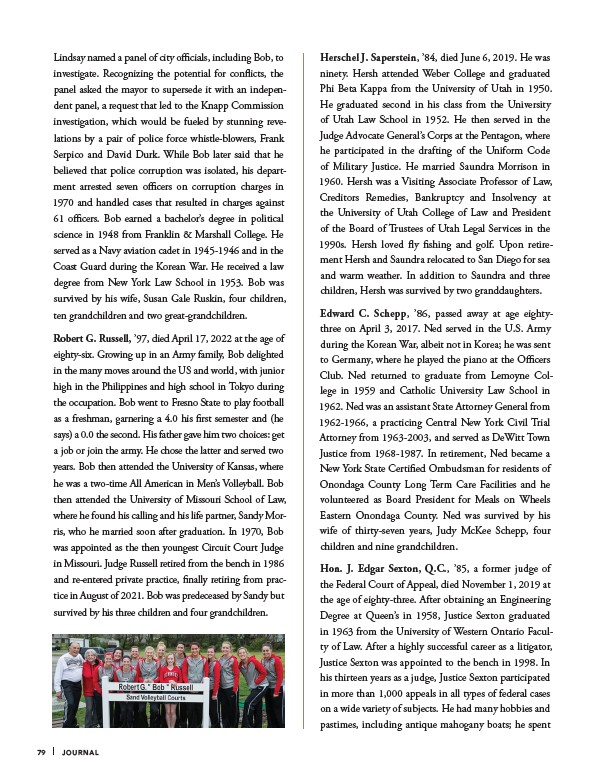
Lindsay named a panel of city officials, including Bob, to
investigate. Recognizing the potential for conflicts, the
panel asked the mayor to supersede it with an independent
panel, a request that led to the Knapp Commission
investigation, which would be fueled by stunning revelations
by a pair of police force whistle-blowers, Frank
Serpico and David Durk. While Bob later said that he
believed that police corruption was isolated, his department
arrested seven officers on corruption charges in
1970 and handled cases that resulted in charges against
61 officers. Bob earned a bachelor’s degree in political
science in 1948 from Franklin & Marshall College. He
served as a Navy aviation cadet in 1945-1946 and in the
Coast Guard during the Korean War. He received a law
degree from New York Law School in 1953. Bob was
survived by his wife, Susan Gale Ruskin, four children,
ten grandchildren and two great-grandchildren.
Robert G. Russell, ’97, died April 17, 2022 at the age of
eighty-six. Growing up in an Army family, Bob delighted
in the many moves around the US and world, with junior
high in the Philippines and high school in Tokyo during
the occupation. Bob went to Fresno State to play football
as a freshman, garnering a 4.0 his first semester and (he
says) a 0.0 the second. His father gave him two choices: get
a job or join the army. He chose the latter and served two
years. Bob then attended the University of Kansas, where
he was a two-time All American in Men’s Volleyball. Bob
then attended the University of Missouri School of Law,
where he found his calling and his life partner, Sandy Morris,
who he married soon after graduation. In 1970, Bob
was appointed as the then youngest Circuit Court Judge
in Missouri. Judge Russell retired from the bench in 1986
and re-entered private practice, finally retiring from practice
in August of 2021. Bob was predeceased by Sandy but
survived by his three children and four grandchildren.
Herschel J. Saperstein, ’84, died June 6, 2019. He was
ninety. Hersh attended Weber College and graduated
Phi Beta Kappa from the University of Utah in 1950.
He graduated second in his class from the University
of Utah Law School in 1952. He then served in the
Judge Advocate General’s Corps at the Pentagon, where
he participated in the drafting of the Uniform Code
of Military Justice. He married Saundra Morrison in
1960. Hersh was a Visiting Associate Professor of Law,
Creditors Remedies, Bankruptcy and Insolvency at
the University of Utah College of Law and President
of the Board of Trustees of Utah Legal Services in the
1990s. Hersh loved fly fishing and golf. Upon retirement
Hersh and Saundra relocated to San Diego for sea
and warm weather. In addition to Saundra and three
children, Hersh was survived by two granddaughters.
Edward C. Schepp, ’86, passed away at age eightythree
on April 3, 2017. Ned served in the U.S. Army
during the Korean War, albeit not in Korea; he was sent
to Germany, where he played the piano at the Officers
Club. Ned returned to graduate from Lemoyne College
in 1959 and Catholic University Law School in
1962. Ned was an assistant State Attorney General from
1962-1966, a practicing Central New York Civil Trial
Attorney from 1963-2003, and served as DeWitt Town
Justice from 1968-1987. In retirement, Ned became a
New York State Certified Ombudsman for residents of
Onondaga County Long Term Care Facilities and he
volunteered as Board President for Meals on Wheels
Eastern Onondaga County. Ned was survived by his
wife of thirty-seven years, Judy McKee Schepp, four
children and nine grandchildren.
Hon. J. Edgar Sexton, Q.C., ’85, a former judge of
the Federal Court of Appeal, died November 1, 2019 at
the age of eighty-three. After obtaining an Engineering
Degree at Queen’s in 1958, Justice Sexton graduated
in 1963 from the University of Western Ontario Faculty
of Law. After a highly successful career as a litigator,
Justice Sexton was appointed to the bench in 1998. In
his thirteen years as a judge, Justice Sexton participated
in more than 1,000 appeals in all types of federal cases
on a wide variety of subjects. He had many hobbies and
pastimes, including antique mahogany boats; he spent
79 JOURNAL